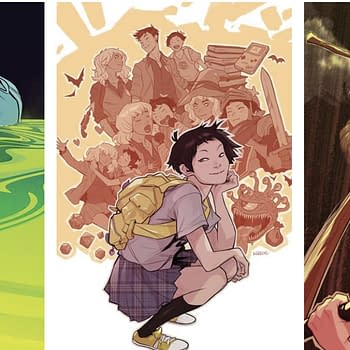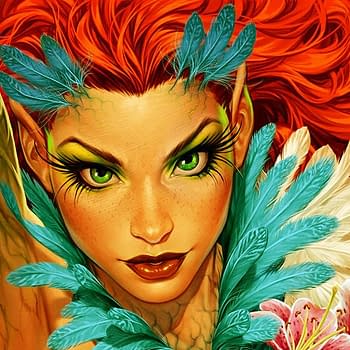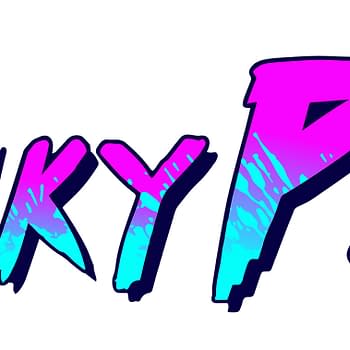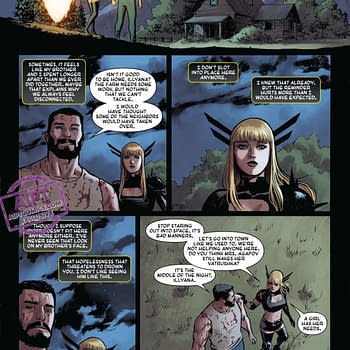Posted in: Recent Updates | Tagged: avatar, christos gage
Day Of Absolution: Talking with Christos Gage

Christos is a TV/film/comics writer with credits for Numb3rs, The Authority, Law And Order, Thunderbolts, Teenage Caveman and Union Jack amongst many others.
About a superhuman self-justified serial killer, we're talking Green Lantern meets Dexter. Quite the heady combination. So I took time to ask Christos about some of the themes and thinking around the series. I was very patient…
Bleeding: It seems every few weeks we hear about another gun massacre in America. Sometimes a schoolchild, sometimes an annoyed worker, sometimes an aggreived family member. Why is the gun so often seen as the solution?
Christos: I think violence has been seen as the ultimate solution since the dawn of man. The gun is just the perfection of the art form, if you will. Deadlier than the fist or the knife, but more personal than the bomb. Combine that with a culture in America that has always had guns as a big part–from the Revolution to the "taming" of the frontier to the Wild West to Al Capone to gangsta rap–and quite frankly it doesn't surprise me at all that these things occur, though it does sadden me. Which is not to say there are times I don't fantasize about taking a nice, firm gun and blowing away someone who's bothering me. Far too many times, actually. So it's probably a good thing I don't own a gun (although a taser would be nice, twitching has a certain appeal). As relates specifically to ABSOLUTION, even though John Dusk doesn't need or use a gun to kill, I think you're asking why killing is seen as the ultimate solution. It's because this is a man who has seen everything else fail. The law is structured on the premise that it's better to let a guilty man go free than imprison an innocent (which I happen to agree with). The courts are reluctant to put people away for violent crimes, preferring to issue mandatory minimums for drug offenses instead, which has always baffled me. The prisons themselves seem to be finishing schools for criminals, making no distinction between violent and nonviolent offenders (something else that baffles me), turning inmates loose equipped with new friends, education and traumatic experiences all designed to make them worse than they were when they went in. Then we send them back into society, even in cases where–as with pedophiles, for instance–research suggests the likelihood of reoffending is high. I've been talking to real life cops about this and, while I'm pleased to say none of them has gone John Dusk's route, they absolutely understand it. John Dusk sees killing as a solution because it works when nothing else does. Oh, and I should point out that the gun massacre is no longer an American thing, my limey friend. We've done a fine job of exporting it. Democracy's next! Or maybe "The Apprentice".
Bleeding: Oh we've had it for a century, just like comic books. It just seems like, also with comic books, America has made it its own, a speciality almost. But do you see it as government's business to restrict the ownership of guns? Would John Dusk interpret his own powers as part of the Second Amendment? And do you hold the American constitution to be sacrosanct in this regard?
Christos: My personal viewpoint is that trying to ban things people really want generally doesn't seem to work. Limiting them is probably a better idea. I think you can sell people on the idea that they shouldn't have "cop-killer" bullets a lot better than you can sell them on the idea that they shouldn't have guns at all. I don't know if it's the government's business to restrict ownership of guns, but I think their ownership and use could be restricted at least as much as that of motor vehicles. I understand why the Founding Fathers put the Second Amendment into the Constitution. One, a well-regulated militia had just liberated our country, so it made sense to keep it going. Two, I think they realized that if only the people in power have weapons, they are more apt to oppress the rest of us. Having said that, I don't believe the Founding Fathers intended the words "shall not be infringed" to mean that any American should be allowed to have any weapon under any circumstance. They were more thoughtful and understanding of changing conditions than that. And they never saw the technology that allows one sociopath with way too many hours of Call Of Duty under his belt to wipe out a building full of people. We accept that freedom of speech, which is protected by the First Amendment, has limits–the proverbial "yelling fire in a crowded theater" example –and, while I believe law abiding citizens have every right to own firearms, I think it's not unreasonable to put some limits on the Second Amendment as well. You don't need a machine gun to hunt deer or protect your family. As for John Dusk, I don't think he'd interpret his powers as part of the Second Amendment. He probably wouldn't intellectualize it that much. He would see his powers as coming with an obligation to use them to benefit society. It's his interpretation of how to do that that might give some people pause.
Bleeding: You seem to think about your own work more politically these days. It seems to have become more political as it progresses. From Teenage Caveman through Union Jack, The Authority, Thunderbolts, Civil War, War Machine and now Absolution. Is this coincidental, a reflection of a change in yourself, a growing ability to choose the projects that reflect your own preferences -or something else?
Christos: First of all, I love that you see Teenage Caveman as political! No, it hasn't been intentional. Quite honestly I'm surprised to see some of the books that made your list, because with several of them I set out to write a big widescreen summer movie, or a massive fight, or something else apolitical. I think any time you set out deliberately to make a political point, it's death, at least as far as entertainment goes. I subscribe to the old adage that if you want to send a message, you should call Western Union. The goal is to tell a good story. Having said that, politics is inevitably going to affect some projects. I don't see how you can write something like AVENGERS: THE INITIATIVE, in which I'm currently exploring the ascension of a criminal sociopath to the position of Director of National Security and his efforts to pass criminals off as heroes, without getting into matters like media manipulation, spin, the culture of celebrity, corruption, corporate influence on government, and many other very political topics. But you can't force it where it doesn't belong. I remember when I wrote the DEADSHOT miniseries, one guy on a message board (yes, I read them–anyone who says they don't lies except Garth Ennis and Alan Moore) assumed I was a right-wing gun enthusiast. I loved that, because I'm quite the opposite, but it tells me I was able to write about the character, not myself. Which is a relief, because I don't think DEADSHOT: CAT FANCIER would sell that well. That said, I don't see my work as being as political as that of a lot of writers. I joke with Avatar publisher William Christensen about having the only comics company that has a "killing the President" sub-genre (that would include 303 and BLACK SUMMER), but both of those stories were primarily about good reads and compelling characters, at least for me. Maybe Garth Ennis and Warren Ellis set out to write political stories and managed to entertain in the process, but if you're going to do that, you'd better have some serious chops. And I don't think I'm at that level. So yes, I might inject some politics into stories where it's appropriate, but I'm also more than happy writing WORLD WAR HULK: X-MEN, which I freely admit is a three-issue-long fight scene, but which I'm as proud of as anything I've done.
Bleeding: Oh, Avatar won't publish every "killing the President" proposal it receives. I know this first hand! No, I was more seeing a movement in your work from non political to overly political stories and was wondering if that was conscious or opportunist. I remember Alan Moore bemoaning his Killing Joke book because it was just about Batman and The Joker and very little else. Do you have any similar disatisfaction over books that are just a fight scene, or it part of the spice of life?
Christos: Not conscious, no. And I love writing fight scenes. WORLD WAR HULK: X-MEN is one of the most fun projects I've ever done, and one of the best received by the readers. I think I'd get sick of writing anything over and over again, whether it's superhero brawls or psychological thrillers or horror or whatever, but I'm lucky in that I have a pretty nice variety of material on my plate. I just assess the project, try to think of the best possible story I could tell given whatever parameters I'm handed (if any), and do that. That's my job as I see it. Sometimes it involves political themes, and sometimes it involves zombie dinosaurs. You take it case by case.
Bleeding: So how does the medium affect the story you try to tell? What strengths and weaknesses do you see that the medium of TV and movies have in relation to those of comics?
Christos: The big advantage TV and film have over comics (aside from a bigger audience, which has nothing to do with the art form itself) is that actors can act. You can leave more unsaid and be more nuanced when you have good performers who can get across subtext and conflicting emotions. I'm not trying to discount the skill of a top comics artist in conveying emotion through their drawings, of course they can, and they can do it brilliantly–but there's something a human being can do that a static art form can't match. That aside, I feel the advantages are all in comics. First–and every screenwriter who's tried comics cites this as their greatest joy–comics give you an unlimited budget. Stan Lee and Jack Kirby did a storyline some forty-plus years ago featuring the Silver Surfer and Galactus (and the FF, and Galactus' home, and the Ultimate Nullifier, etc. etc.), but when a big-budget movie tried to base itself on that story, it couldn't do both. Galactus had to fall by the wayside because the Surfer and the Fantastic Four tapped out the budget. I've said it before and I'll say it again, the biggest budget on Earth can't match the low-tech combination of Jack Kirby and a pencil. Second, while comics is also a collaborative medium, there are far fewer collaborators. Fewer cooks in the kitchen. The vision is much more pure. Someone like Alex Toth could write, draw, letter–do everything themselves, while even Woody Allen (who writes, directs, edits, produces, does the music, etc.) still can't perform every role in a film. And then there are the endless rewrites, based on notes offered by everyone from the producer's mistress to advertisers who want products placed. Often the writer isn't even aware of what's been changed until they see it on the screen. Comic fans complain about editorial interference, but it's nothing compared to Hollywood. Brian Bendis tells a story about how he went to work on the Spider-Man cartoon, and he complained to a producer because only 40 percent of what he wrote made it onto the sceen. The guy said, "So? In this business, 40% is great." And Bendis replied, "Well, in comics, 100% of what I write makes it onto the page, so fuck you, I'm going back to that." (I'm paraphrasing, of course.) I've ventured into a whole different topic from comparing the relative artistic merits of different media, but if you get into the business aspects of it, oh my God, people in comics are so much nicer, saner and more professional than people in Hollywood. Writing comics is vastly more creatively satisfying. I was a professional screenwriter–as in making a living off it–for six years before breaking into comics, and the number of projects I worked on–many of which I got paid for–that never saw the light of day is ridiculous. Whereas the number of comics I've written that haven't been published is exactly one, and I got paid for that. Sure, the money per project is better in Hollywood, but you also spend a ridiculous amount of time writing stuff you aren't getting paid for–treatments, free rewrites, pitches, specs. It'll give you cancer, seriously. I like Hollywood much, much better now that I don't need it. Getting back to the art form, I suppose it's possible that the language of comics is a harder one to understand if you don't grow up with it…I wouldn't know, having taken my first hit off the pipe longer ago than I can remember, but some friends who didn't grow up with it have told me they have a hard time following it. But I think that can be learned, just as I could probably learn to appreciate opera if I made an effort. My wife didn't grow up reading comics, and has zero interest in superheroes, but she's enjoyed things like Preacher. At the end of the day, bottom line, comics are cooler. That's not my opinion, it's just fact. I guess it's possible that some day people might figure out how to take the fun out of comics the way they so often do with film and tv, but if so, I hope the long-predicted death of the industry occurs before that happens.
Bleeding: A number of comic creators of late have discussed just the kind of interference it seems you see in Hollywood – editorially mandated storylines, characters and their availability changing post-script, post-art on occasion. On the other hand you have TV shows like Doctor Who which is basically Russell T Davies doing what he wants, with his good friends.
But with more and more people jumping from comics to TV to comics I was wondering how the actual words-on-the-page differs. Can you take a TV scene and make it a comics scene? Vice versa? What are the traps you could fall into, between the two media?
Christos: A TV scene translated directly into a comics scene would probably come off as very talky and boring. In a TV script, you almost don't need to read the stage directions, which tend to be very sparse. It's much more dialogue-driven, because of budget, the limited number of locations and special effects available to you (something like LOST being an exceptional situation), etc. Movie scripts are closer to comic scripts, but there again, you are working in different media. I've become very conscious of the page as a unit of storytelling. A movie doesn't have that; their unit is the scene, and that could run one page or five. Sure, you can approximate a sudden, shocking reveal in a movie when you're doing a comic by structuring it so the reveal comes on page 2 after being teased on page 1, and you can suggest the effect of a comic book double page spread in a movie with a big wide shot (although you are NOT allowed to dictate shots in a movie script nowadays–that's a big no-no, it's considered trying to do the director's job, and the sign of an amateur). Having said that, you can adapt most anything to anything else. But you can't just cut and paste. The biggest trap I fell into when I started doing comics was not realizing how much an artist can do in a panel. Comics are the illusion of motion. You can't say "PANEL ONE: The Hulk picks up a car and throws it." It takes one panel to pick up a car and another to throw it. As for traps going the other way, as I mentioned, you can be a lot subtler in on the screen. You can leave more unsaid. I co-write screenplays with my wife Ruth, and she is the one who reins me in when I'm getting too "comic-booky". "Show, don't tell" is an old writer's saw, but it applies more to movies than anywhere else. One of my favorite pieces of writing in a movie ever is in UNFORGIVEN, when the hooker tells Clint Eastwood that his best friend's been killed. Clint is with a kid who's got a bottle of whiskey. He doesn't react to the news by yelling, cursing, snarling or even saying anything. All he does is take the whiskey from the kid and take a drink…and right there, you know that a whole shitload of people are going to die horribly, because the filmmakers have skillfully threaded throughout the film the idea that Clint doesn't drink any more, he's changed, he used to be mean when he drank and kill people brutally, and now he won't touch liquor even to keep warm in a rainstorm, even if it means getting deathly ill. But now he drinks, and its a moment that is so small, yet hits like a ton of bricks. In comics, I'm not sure you could do it quite the same. You almost have to do it like in Mark Millar's "Old Man Logan", where he won't pop his claws through the entire story until he finds out what happened to his family, and then you hit the reader in the face with that double-page SNIKT! I don't know. In the end, have to let your gut be your guide. When I was in film school, Ray Bradbury spoke to our class, and he said that if you want to tell stories, you have to devour stories. I think that's true, because you can talk about it and analyze it to death, but at the end of the day you have to know what works because it just feels right or wrong for the story you're telling in the medium you're telling it in.
Bleeding: Thank you, Christos. Try not to get into too many vigilante-themed fights on the way home now…
Absolution #0 at $1.99 is available today in the USA and tomorrow in the UK. Other territories may vary. It is published by owner of BleedingCool, Avatar Press.











